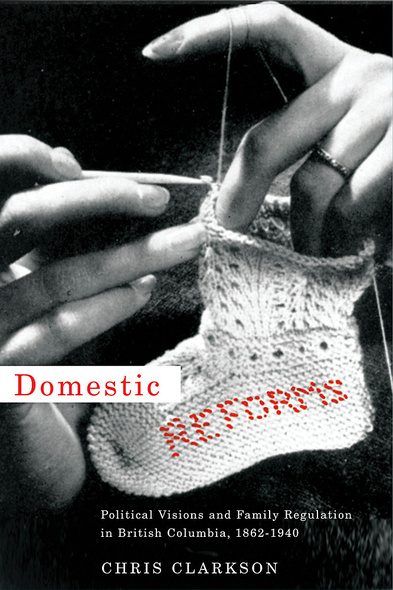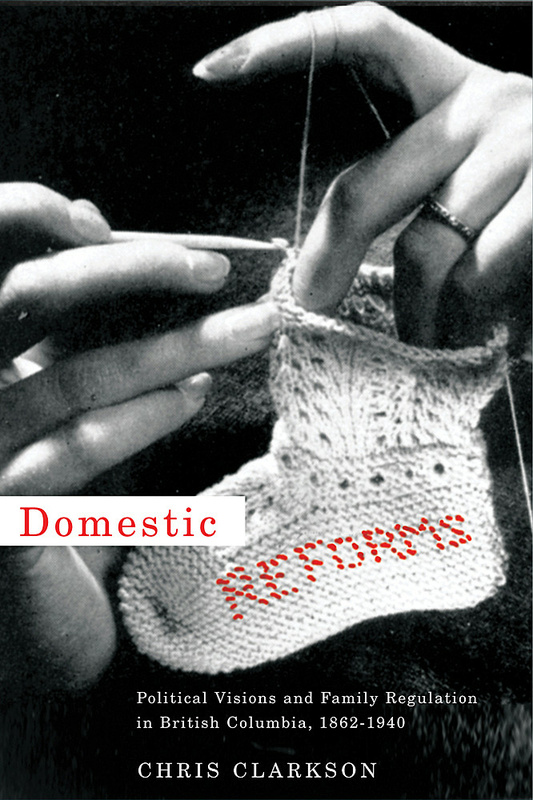Our shopping cart is currently down. To place an order, please contact our distributor, UTP Distribution, directly at utpbooks@utpress.utoronto.ca.

Domestic Reforms
Political Visions and Family Regulation in British Columbia, 1862-1940
Domestic Reforms tells a complicated story of family andwelfare law reform within the context of British Columbia’stransformation from a British colonial enclave to a white settlerCanadian province. It inherited a British legal system that grantedmarried men control over most family property and imposed fewobligations on them toward their wives and children. Yet from the 1860sonward, lawmakers throughout the Anglo-American world, includinglegislators on the Pacific Coast, began to grant women and children newrights. Feminist scholars have long debated the reasons for thesereforms. Why did male legislators choose to depart from patriarchalnorms, enacting laws that eroded husbands’ control over propertyand increased their obligations? More important, what were the legaland social consequences?
Chris Clarkson examines three waves of property, inheritance, andmaintenance law reform, arguing that each was related to a broaderpolitical vision intended to precipitate vast social and economiceffects. He analyzes the impact of the legislation, with emphasis onthe ambitions of regulated populations, the influence of the judiciary,and the social and fiscal concerns of generations of legislators andbureaucrats.
Chris Clarkson’s new book, Domestic Reforms, is an important addition, not only to British Columbian family law scholarship, but also to the scholarship on the politics of family law and gender relations in general. Clarkson offers a fascinating and eye-opening account of lobbying, legislative processes and intent, and, sometimes, the unintended consequences of some of the legal reforms passed between 1862 and 1940 in British Columbia. … Clarkson has written a wonderfully complex and rich account of women’s status in British Columbian family law and society. Clarkson’s account powerfully demonstrates why reforms that seemed to be egalitarian turned out to be a double-edged sword.
Clarkson bridges legal history with political, social, and economic history, pulling in from a broad range of works as he sees fit. … One has a vision of Clarkson energetically juggling all the elements of his broad vision, but at the same time managing to keep absolute control of his intricate analysis. … This is an innovative and compelling study, demanding in its complexity, and of interest to a wide multidisciplinary readership.
This book tells a complicated story of family and welfare law reform within the context of British Columbia’s transformation from a British colonial enclave to a white settler Canadian province. It is an original and important addition to the literature on the regulation of families historically.
Part 1: The Yeoman Dream
1. Deserted Wives and Independent Men
2. Married Women, Country Wives, and Destitute Orphans
3. Chivalry and the Democratic Judiciary
Part 2: A Vision of Mutualistic Hierarchy
4. Creditors' Rights, the 1887 Married Women's Property Act,and the Emergence of a Liberal Femininity
Part 3: 'The Conservation ofChild-Life'
5. Maintaining the 'Hope of the Race': Child-Saving in aConservative Era, 1901-15
6. Child Protection and Women's Equality in the Liberal Era,1916-23
7. Public Policy, Published Decisions, and Police Courts
Conclusion
Notes; Select Bibliography






